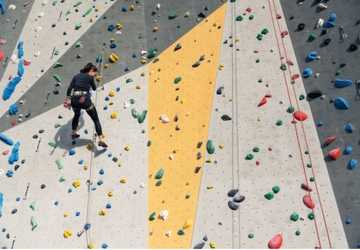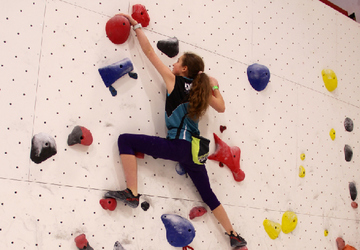A New Horizon of Fitness and Fun
Indoor rock climbing is far more than a mere sport; it's a holistic adventure that combines bodily power, mental tenacity, and unadulterated joy. Against common assumptions, you don't have to be a super-athlete to participate. Truly, anyone can relish the rewards that come with indoor rock climbing. This in-depth article aims to explore indoor rock climbing for beginners, spotlight the best age to start rock climbing, and identify the range of people who can truly relish this versatile pastime.
Getting to the Core: Grasping the Essence

Before diving deeper, it's crucial to have a fundamental understanding of what indoor rock climbing involves. This indoor activity simulates the thrills of climbing natural rocks but in a safe, regulated setting. So, who is the perfect candidate for indoor rock climbing for beginners? The straightforward answer is, anyone and everyone!
Prioritizing Well-Being: The Managed Atmosphere
One of the standout attributes of indoor rock climbing is its guaranteed safety level. Unlike outdoor climbing where the climate can turn capricious, indoor climbing centers provide a risk-managed setting. This feature positions it as a prime choice for novices who want to master the basics without the unpredictability of outdoor elements.
Who's the Ideal Candidate for Indoor Rock Climbing?
The Younger Generation
When it comes to pinpointing the best age to start rock climbing, the advantages it brings to younger participants can't be overlooked. Children as young as four or even five can dive into the world of indoor rock climbing, granted they are under proper guidance. It's not just a platform for physical growth; it also instills essential life skills like critical thinking, collaboration, and self-control.
Adults: There's No Age Barrier
The beauty of indoor rock climbing is that it doesn't come with an age restriction. Adults of varying ages find the experience thoroughly enriching, both for the body and the mind. It serves as a holistic workout while also acting as an effective outlet for stress relief. If you're an adult intrigued by this vibrant activity, there's no reason to hold back.
The Golden Years
Indeed, seniors are not left out of this exciting journey. Indoor rock climbing offers a less strenuous form of exercise that can be tailored to meet individual health requirements. So if you've been pondering if you're beyond the age to start, reconsider!
A Beginner's Roadmap to Indoor Rock Climbing
If you're new to this exhilarating pastime, there's good news—indoor rock climbing is welcoming for people of all skill levels. You don't need an athletic background or any prior climbing expertise to get started. Indoor rock climbing for beginners comes with entry-level courses that guide you through essential climbing skills, setting the stage for you to grow into a skilled climber.
Baby Steps on the Wall

Don't fret when you see seasoned climbers gliding up walls as if it's second nature. Remember, they were beginners at one point too. Indoor climbing facilities usually offer beginner-friendly walls and routes. So, your best bet is to start with these simpler challenges and gradually progress.
Value of Professional Help
Seeking the assistance of a qualified instructor during your first few climbs can make a world of difference. These experts can impart crucial climbing techniques, ensure you're following safety guidelines, and help you maximize the benefits of your climbing sessions.
Gear Essentials for New Climbers
When you're just starting, the world of climbing gear can appear daunting. You don't have to invest in a full kit right away, though. Many climbing gyms rent out essential gear like shoes and harnesses. As you gain more experience and decide that indoor climbing is indeed a long-term interest, you can start acquiring your own equipment. Selecting the right pair of climbing shoes and a comfortable harness will greatly enhance your experience.
Understand Climbing Grades
Climbing grades, or the difficulty level of climbing routes, can vary from gym to gym. As a beginner, you may feel confused about how to interpret these ratings. Typically, indoor rock climbing for beginners will focus on routes with lower grades. These are designed to be more straightforward, allowing you to build your skills incrementally. Understanding how these grades work can guide you in choosing routes that are challenging yet achievable.
Mastering Basic Techniques
It's not just about pulling yourself up; effective climbing techniques involve a balanced coordination between your legs and arms. It's about strategically placing your hands and feet and knowing when to shift your body weight. Learn the basic moves like 'smearing,' where you use the rubber of your climbing shoe to gain traction, or 'flagging,' where you use one leg for balance as you move. Your instructor will guide you through these techniques, making your climb not just possible but also more efficient.
Embrace the Mental Challenge
Don't underestimate the psychological aspect of climbing. The sport isn't physically taxing; it also requires mental resilience. Whether it's overcoming the fear of heights or solving the 'puzzle' of which holds to use, climbing is a comprehensive brain workout. This is often an unexpected yet fulfilling aspect of indoor rock climbing for beginners.
Social and Community Benefits
Climbing isn't just a solitary activity; it's also a social sport. The climbing community is generally supportive and welcoming to newcomers. Joining a group or attending community climbing events can not only make your experience more enjoyable but also offer you helpful tips and encouragement from more experienced climbers. It's a fantastic way to meet like-minded people and make new friends.
Conclusion: The Universal Appeal
As we've discussed, the best age to start rock climbing can vary. From children and adolescents to adults and seniors, there's no age limit to who can enjoy this fantastic sport. Indoor rock climbing for beginners is an accessible, safe, and incredibly rewarding activity that offers a comprehensive workout and a host of mental benefits. So, if you're contemplating whether to give it a try, don't hesitate. The climbing community is ever-welcoming, and the experience can be transformative.








